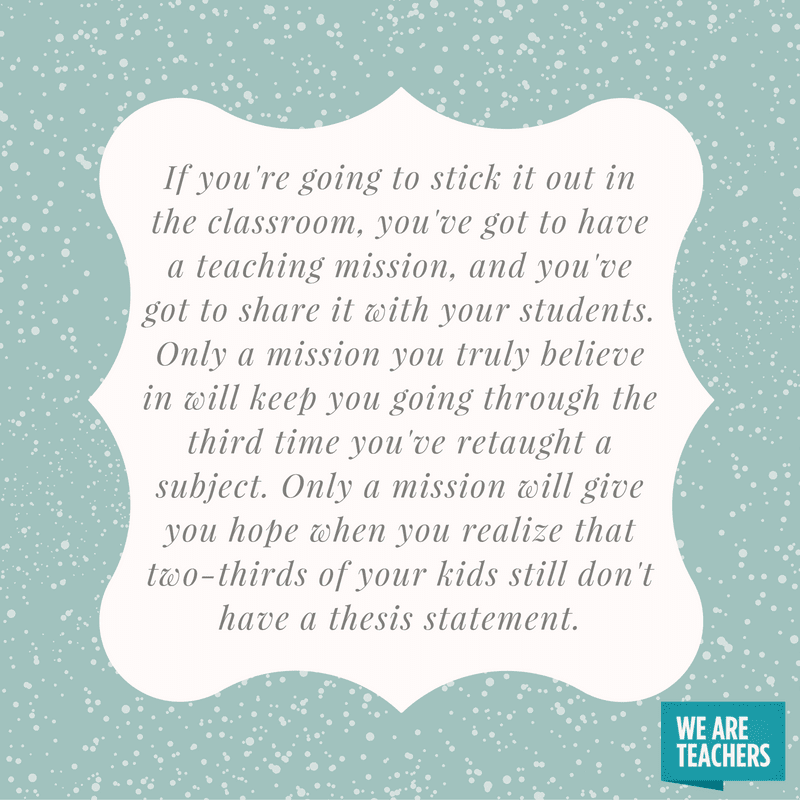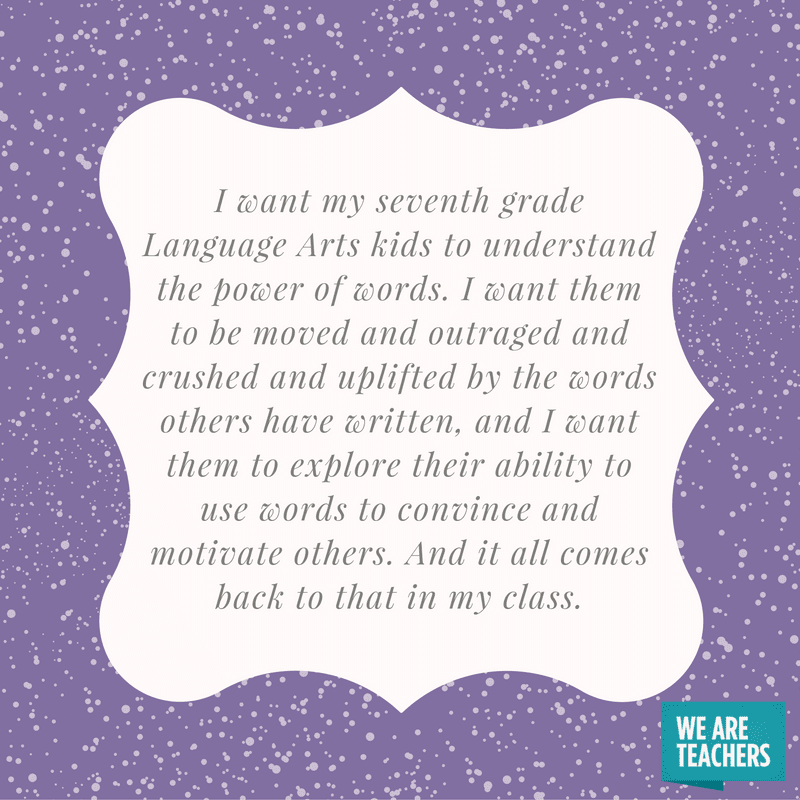Here’s something I’ve learned from 12 years in my own classroom and from watching colleagues come and go: If your main goal is to get your kids to pass a standardized test, you’re going to burn out in a matter of class periods. That’s what your administration wants you to do (even if they don’t say it in so many words). It’s what the government wants, and it may even be what the parents want. But trust me; make test scores your number one goal and you’ll want to drive in front of a train before the end of the first grading period.
If you’re going to stick it out in the classroom, you’ve got to have a teaching mission, and you’ve got to share it with your students. Only a mission you truly believe in will keep you going through the third time you’ve retaught a subject. Only a mission will give you hope when you realize that, after three weeks of work on their persuasive essays in class, two-thirds of your eighth graders still don’t have a thesis statement. Only a mission will keep your kids (somewhat) focused on a full moon before a holiday.

So what does a mission look like? It’s easier to tell you what it’s not. It’s not something you can put on your teacher evaluation from, because a mission is not specific, measurable, and attainable. 70% of your students demonstrating 80% proficiency of standard M61.4 is a goal, not a mission. A mission looks like this: My social studies classes will gain a sense of the ways in which all societies are connected, as well as the cyclical nature of history. Or maybe you want your math students to gain a systematic approach to problem solving and the confidence to apply those skills to real-world problems.
Me? I want my seventh grade Language Arts kids to understand the power of words. I want them to be moved and outraged and crushed and uplifted by the words others have written, and I want them to explore their ability to use words to convince and motivate others. And it all comes back to that in my class. When we read, when we write, we talk about the power of language, and how vitally important it is for my kids to harness that power for themselves. Even when we talk about grammar—my least favorite part of my subject—it comes back to that mission. “You have a message the world needs to hear,” I tell my kids. “We’re not going to let a misplaced comma cloud that message.”

I’ll be the first to admit that this doesn’t work for every kid. But if you’re passionate enough and committed enough to your mission, if it’s truly what gets you out of bed and in the car in the morning, the kids will sense that and they will respond to it.
However, there’s also the issue of government standards. For me, at least, some of these have nothing to do with making my kids better readers and writers. It’s important that they be able to use compound sentences in their writing, but I don’t give a tinker’s damn if they can label it for a multiple choice question. That’s when I bust out the extrinsic motivation. I tell the kids that this is something the government says they have to learn, and I reward them for their time. Win the review game and you get extra credit! The class that shows the most improvement from the pretest to the posttest gets to go outside in study hall! (But never candy. Because I’ve found that if there is candy in my room, no matter how noble my intentions, I will eat all of it.)
For some kids, the extrinsically-motivated drill-and-kill works better, so it’s probably good that this element exists in my curriculum. Most of the time, though, I want my kids—and myself—to have a higher purpose. I didn’t become a teacher because I love standardized testing. And my kids, like anybody else, want to make a difference in the world.

As it turns out, my kids usually do pretty well on standardized testing. I have fewer kids exceed standards than my administration would like, because once I feel like they’ve mastered a standard we move on to something more interesting. But the vast majority of them always pass, which is at least enough to keep my job. And the mission we’re working towards is enough to make me want to keep it.
Do you have a teaching mission? I’d love to hear about it. Please share in the comments.
